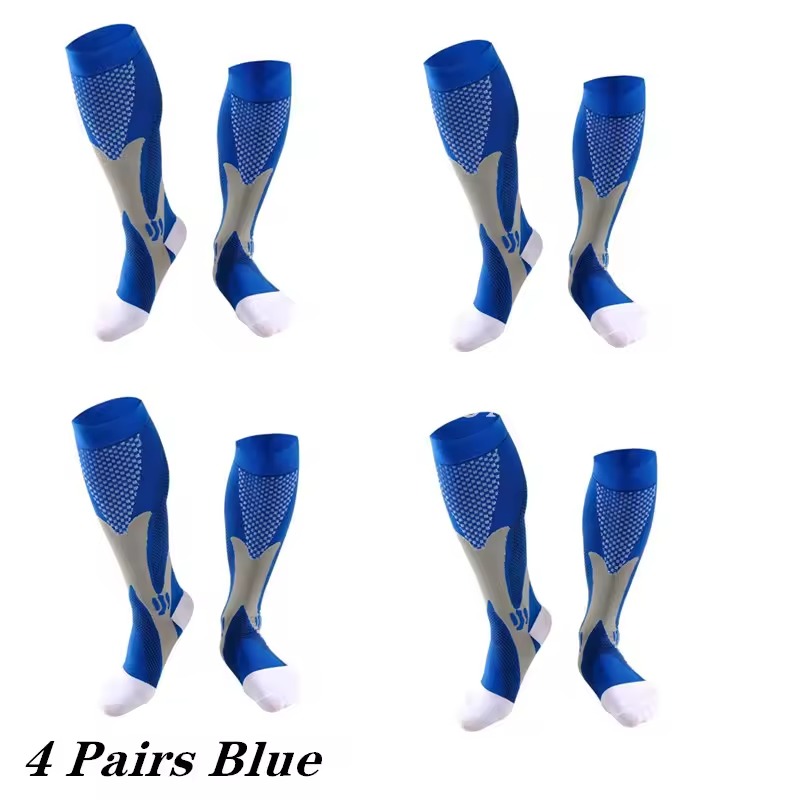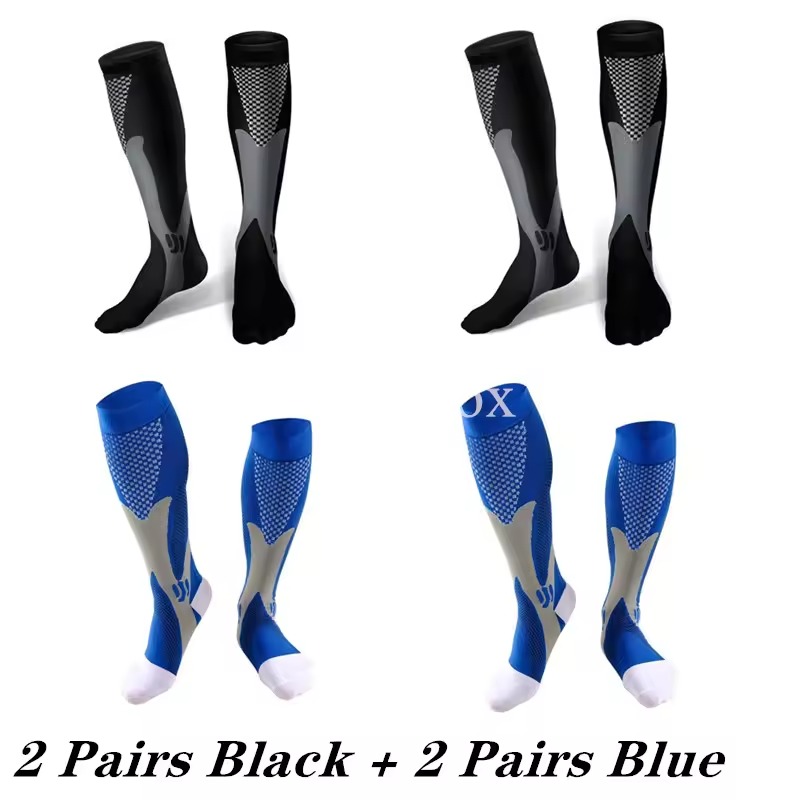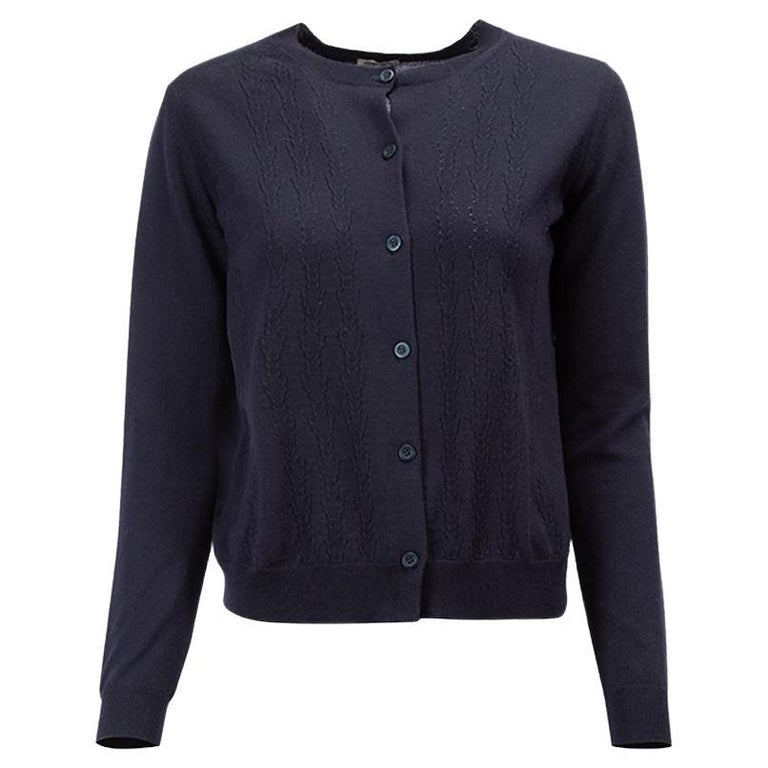What Are Compression Socks?
Compression socks are snug-fitting, stretchy socks. They gently squeeze your legs. This squeeze improves blood flow. It helps move blood up your legs. This reduces swelling and discomfort. People wear them for a variety of reasons. Athletes wear them to boost performance. Travelers use them to prevent blood clots. Doctors may prescribe them for medical conditions. Compression levels vary by type and purpose. The pressure they provide can prevent venous disorders. It supports veins and reduces vein fatigue. Can you sleep with compression socks on? People wonder about this. Experts give different advice. It’s important to understand their use. This ensures safe and effective wear, even overnight.
The Benefits of Wearing Compression Socks
Wearing compression socks offers multiple benefits. First, they enhance blood circulation in the legs. This is essential for those who sit or stand for long hours. Improved circulation can prevent blood clots and deep vein thrombosis (DVT). Athletes may find them useful for faster muscle recovery. They can also reduce leg swelling and fatigue. Over time, this can help avoid varicose veins. Some users report less leg pain when using compression socks regularly. For travelers on long flights, they can be a great aid. They help maintain healthy leg circulation in cramped seating. For those with medical conditions like lymphedema, compression socks are vital. They provide the necessary limb support. These are a few ways compression socks can benefit users day or night.

Potential Risks of Sleeping with Compression Socks
While the benefits of compression socks are clear, it’s important to know the risks of wearing them overnight. Wearing compression socks in bed can lead to several issues. It might cause skin irritation or broken skin if they are too tight. This can happen if the socks are not fitted properly. The constant pressure can be too much for the skin during extended periods. It may also reduce circulation if the pressure is too high. This is the opposite of the intended effect. In rare cases, it can lead to nerve damage or blood clots if not used correctly.
Moreover, some individuals may experience discomfort while sleeping. This can disrupt sleep patterns. You might get hot if the material doesn’t breathe well. Always check the fabric for breathability before buying. It’s vital to balance the benefits with these potential risks. Make sure you consult with a healthcare provider to ensure compression socks are safe for you to wear overnight.
Medical Insights on Compression Therapy
Compression therapy is a treatment approach. It uses controlled pressure to increase blood flow in your limbs. Medical experts recognize its value for certain conditions. It can help manage venous disorders, like varicose veins or DVT. Compression therapy comes in forms like socks, stockings, and sleeves.
Compression aids can vary in pressure levels. Low to moderate pressure is for daily wear. Higher pressures are for specific medical conditions. They need a doctor’s supervision. The right level of compression can help the veins return blood to the heart.
Doctors often suggest compression for patients after surgery. It can prevent blood clots during recovery. For those with venous ulcers, compression can speed up healing. It also assists in reducing leg swelling for those with poor circulation.
Can you sleep with compression socks on? Medical insights say it depends. The risk of complications exists if worn improperly or for too long. Patients should get a healthcare provider’s advice before using them overnight. They can check your condition and recommend the best option.
Each person’s need for compression therapy is unique. Necessary pressure levels and duration may vary. You must use products designed for extended wear if using them while sleeping.

How to Choose the Right Compression Socks for Sleeping
Choosing the right compression socks for sleeping is crucial. Here are points to consider:
- Measure your legs correctly. Ensure you have the right size for a snug, not tight, fit.
- Select the correct compression level. Opt for mild to moderate compression for night use.
- Consider material and breathability. Look for socks made of fibers that allow air flow.
- Check the length of the socks. Knee-high socks are the most recommended for overnight wear.
- Pick a comfortable top band. It should neither be too tight nor roll down as you sleep.
- Get advice from a healthcare provider. Before buying, consult a professional, especially if you have a medical condition.
By following these tips, you can make an informed decision when choosing compression socks for night-time use. Remember, the aim is to benefit from them without risking your health. Always prioritize comfort and proper fit over everything else.
Guidelines for Wearing Compression Socks at Night
When choosing to wear compression socks overnight, it is essential to adhere to some guidelines to ensure safety and effectiveness. These recommendations will help you avoid potential risks associated with improper use.
- Select the appropriate compression level. For night-time use, mild to moderate compression is often best. Heavy compression might be too intense for extended periods.
- Make sure of the proper fit. Ill-fitting socks can cause discomfort or even restrict circulation. Measure your legs to get the right size.
- Check for medical-grade products. High-quality materials make sure comfort lasts through the night. It can also help to prevent skin issues.
- Consider the fabric’s breathability. Choose materials that let your skin breathe to keep cool while you sleep.
- Wear them for the right duration. Don’t keep socks on for too long. Follow manufacturer recommendations or doctor’s advice.
- Listen to your body. If you feel discomfort or pain, take off the socks. Your body’s signals are important.
By following these steps, you can enjoy the benefits of compression socks even while you sleep. Just always check that the product and practice suit your personal needs. And remember, when in doubt, seek advice from a healthcare professional to guide you on can you sleep with compression socks on according to your health circumstances.
Alternatives to Overnight Compression
While many find relief wearing compression socks at night, alternatives do exist. It’s essential to explore options if you face discomfort or risks. Here are some alternatives to overnight compression:
- Elevate your legs. This can help with circulation. Use a pillow to raise your feet above your heart.
- Do leg exercises before bed. Light stretching or simple movements can enhance blood flow.
- Stay hydrated. Drinking water helps maintain healthy circulation. Avoid caffeine or alcohol before sleeping.
- Wear loose-fitting socks. If compression is too tight at night, switch to more relaxed socks.
- Use a bed wedge. This supports your legs in an elevated position throughout the night.
- Try daytime compression only. Wear socks during the day and give your legs a rest at night.
- Massage your legs. Gentle massage can stimulate circulation without the need for socks.
Choosing one of these alternatives may provide the help you need without compression. Remember, the goal is to maintain good circulation and prevent leg issues, like swelling or clots. If you’re still unsure about what to do at night, it may be best to consult a doctor. This way, you can get advice tailored to your specific needs.

When to Consult a Doctor
Consulting a doctor is a critical step when considering compression socks for overnight use. Here are specific situations where professional advice is invaluable:
- If you have a medical condition. Especially those affecting blood flow, like diabetes or heart disease.
- Before using compression therapy. For advice on whether it’s suitable for you.
- If you experience negative symptoms. Such as pain, numbness, or skin issues while using the socks.
- After any major surgery. To prevent clots, doctors may recommend specific compression gear.
- When there’s persistent swelling. If swelling doesn’t reduce with compression socks, seek medical guidance.
- For tailored recommendations. Each person’s health varies, and so do the needs for compression.
It is safer to ask a professional about ‘can you sleep with compression socks on’ than to guess. They can assess your individual risk and benefit ratio. Remember, proper medical oversight is key for safety. Trust your doctor’s expertise to guide you with the best advice for your health.










